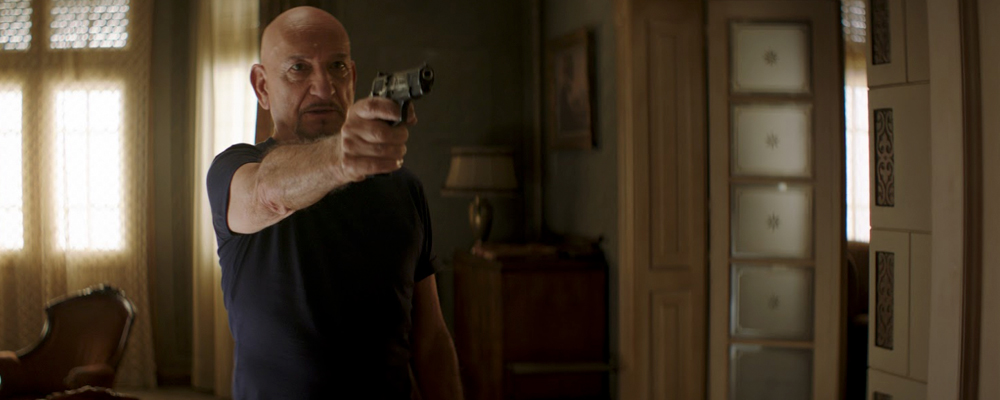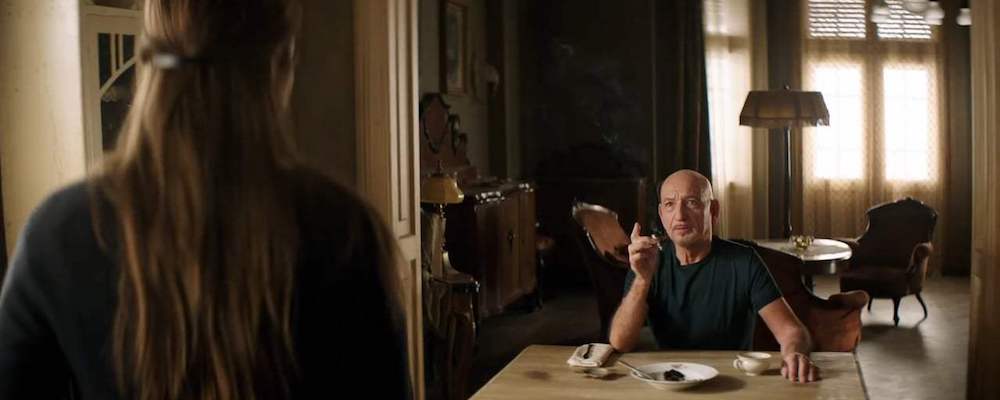‘An Ordinary Man’ Director Brad Silberling Talks Finding a War Criminal’s Humanity
Sandra Miska
“I will never hide. And I will never be taken.” These are the words spoken by a Ben Kingsley as a character simply known as the General, an Yugoslavian war criminal in the drama “An Ordinary Man.” In hiding with limited contact with the outside world, Tanja (Hera Hilmar), a young cleaning woman, enters the General’s life just as the American authorities are closing in on him. Despite his hubris and history of crimes against humanity, the General has much of the same needs and desires as most other people, and “An Ordinary Man” offers a compelling portrait of a person facing a reckoning in the twilight of his life.
“An Ordinary Man” was written and directed by Brad Silberling, who took a break from directing the pilot of the upcoming CW drama “Charmed,” a feminist reboot of the original WB series, to speak with Entertainment Voice.” Although Silberling has previously tackled heavy subject matters such as grief and death in features like “City of Angels,” “Moonlight Mile” and “Lemony Snicket’s A Series of Unfortunate Events,” this latest work is undeniably his darkest yet.
“I never know where the subject’s going to come from,” answered the director, who also currently serves as an executive producer on the hit series “Jane the Virgin,” when asked him what compelled him to tell this particular story, one that deals with the aftermath of the Bosnian War. “I was sort of predisposed. I had taken three films over the years to the Sarajevo Film Festival, which I adore, and got to really fall in love with the region and was very confused and struck by the loss on all sides. When I was reading about some of the fugitive war criminals who were managing to elude capture, it was infuriating, but I had to believe somewhere there was an emotional justice to be had, and I read of one of them from Serbia, Dragomir Milosevic, who was the general who had led the siege in Sarajevo, and his own daughter had committed suicide because of what he had done. And that’s what grabbed me, and I thought, a man like that thinking he has an opportunity to essentially get a do-over in his own dark way, but he can’t change fate, because he refuses to take responsibility… That was a story I wanted to tell.”
The humanity in the General comes through most clearly when he speaks of his daughter, whom he lost partly due to his own actions. He gets a do-over of sorts with Tanja, an orphan, who, like him, has become a loner due to circumstances, or, as he puts it, “a ghost.” Kingsley, whom Silberling praised for being an incredible collaborator and “just a dream” to work with, is engrossing to watch as he finds himself becoming more and more intrigued by the younger woman, eventually exhibiting almost paternal behavior towards her. Hilmer, for her part, holds her own against Kingsley, struggling to remain cool as she experiences conflicting emotions as the cautious Tanja, who is revealed to be hiding something major from the General. It’s difficult to discuss what happens next without spoiling the plot, but, suffice it to say, captivity has done little to damper the General’s ego, leading to severe consequences that unfold in an almost operatic fashion.
For this unlikely relationship, Silberling found inspiration in a little-known connection a captive Saddam Hussein formed during his final days.
“They assigned one young FBI agent to come and be the only human contact he would have, and he lived for that. All he had were questions for the guy about his life and his youth and his upbringing, and it told me so much, because, Hussein, he did so many atrocious things, but he kind of needed to feed off of the life, and in a weird way, the possibilities of goodness, even though in the end he couldn’t let that into his own soul. That’s very much true for this character, he refuses to believe that he’s responsible for his daughter’s death, and, yet, he clearly mourns the experience he didn’t have with her and wants to try and get a taste of it.”
Silberling first started writing “An Ordinary Man” almost a decade ago, and during the time that passed the world has arguably become a darker place, making the story perhaps more relevant. What is it that he hopes the viewer takes away from the film?
“Well, the same root belief, which is in the end, nobody escapes an emotional justice, and that it’s hard when you see what goes on out there. I’m so struck by these kids from Parkland. Thank God they’re speaking up, and thank God they’re making an effort, because you can just at times feel like it’s hopeless… I believe in the possibility of youth, and, yet, at the same time – There are many Generals in the world, people who are filled with conviction, and it’s dangerous because it’s unbalanced and there’s no personal responsibility. They will not escape their own justice, and it’s going to be emotional.”
Along with his wife, actress Amy Brenneman, Silberling is a dedicated social activist, gun control being an issue he is particularly passionate about. Following the 2012 mass shooting at the elementary school in Newton, CT, he penned a powerful essay for HuffPost in which he not only discussed the devastation caused by gun violence in his own life, but also called for those not currently dealing with the immediate aftermath of losing a loved one to do the “heavy lifting” in leading the charge for change.
“I had to hope and believe,” said Silberling when asked if he ever envisioned a movement like that one taking place today. “I’m happy I’m seeing it, because those kids are going to be voters shortly, and they are not going to stop. And it is heavy lifting. If everybody, unfortunately, takes a step back and just shrugs shoulders, nothing changes, especially when it comes to gun violence, and the idea that there’s this impenetrable wall from American culture of guns. Yes, but it’s not imprenetable. Our country was founded on resistance, and resistance does create change.”
“An Ordinary Man” opens April 13 in select theaters, VOD and digital platforms.





